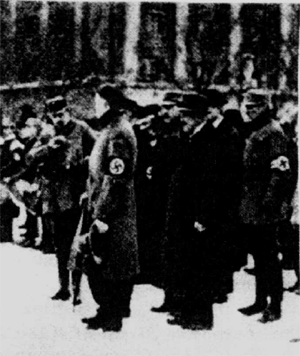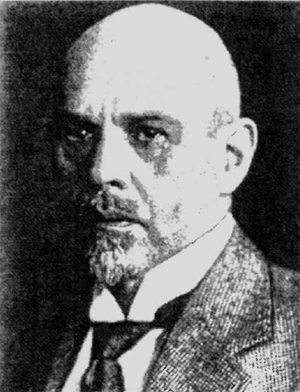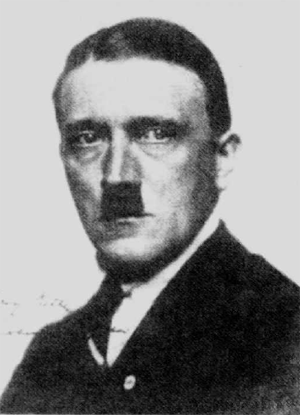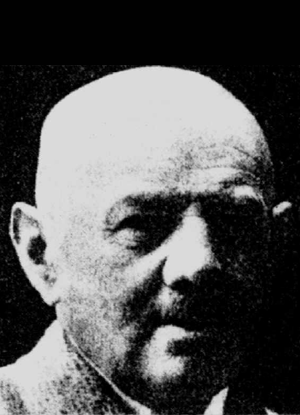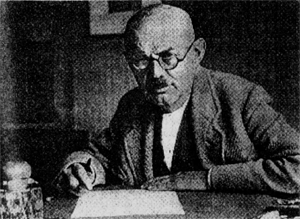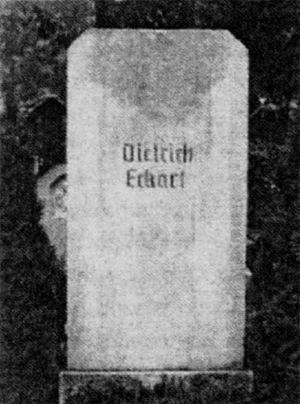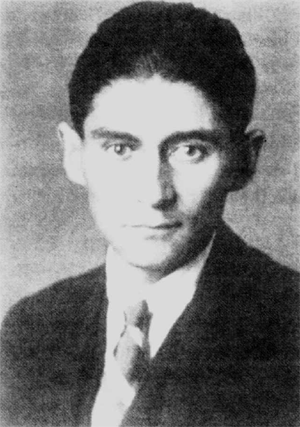"Dietrich Eckart ... was Hitler's mentor and the spiritual founder of National Socialism."
-- William Gillespie
"(Hitler and Eckart) developed a close personal as well as political relationship. It was the most important friendship in the lives of both men."
-- Ralph M. Engelman
Adolf Hitler's father Alois has been described as a "vigorous, opinionated, bullet-headed man" who held court in local taverns. The same brief description fits his "fatherly friend," Dietrich Eckart. British-American historical scholarship still tends to overlook Eckart in spite of his seminal importance as Hitler's mentor.
The parallel lives of Dietrich Eckart and Adolf Hitler both conformed to a pattern of let-down followed by public acclaim. Disappointments wounded both of them, creating the same spiritual malady. Hitler and Eckart projected their dread and inner concupiscence onto "The Jew," a mythical stereotype . which embodied malevolence in their minds. Carl Gustav Jung spoke of this process as "objectifying one's shadow." Bruno Bettelheim, who systematically researched the etiology of anti-Semitism, thought of it as externalizing and personifying one's own inner conflicts. Eckart and Hitler felt painful angst due to alienation and an "inner void," but misdiagnosed European Jewry as its root cause.
Their compatibility derived in part from a common pathology. Dietrich Eckart was a heavy drinker and drug addict, Adolf Hitler the codependent son of an alcoholic, who habitually acted like a "dry drunk." The addictive behaviors exhibited by both men included grandiosity, hypersensitivity, refusal to admit mistakes or compromise, petulance, desire for revenge, morbid feelings of doom, manipulative schemes, and spiritual emptiness. Hitler consistently engaged in all-or-nothing ventures, as illustrated by his huffy resignation from the party in 1921, suicide threats when things went wrong (e.g. after the Beer Hall Putsch's failure,) and compulsive need for conquest during World War II. Perhaps most significantly, Hitler and Eckart both possessed the substance abuser's propensity toward bigotry. They projected their inward dread, guilt, and sinful inclinations onto Jews. Psychologists point out that projection reinforces denial and helps an addict preserve the status quo. He or she will derive comfort from the illusion that 'X' is the problem, not me.
Dietrich Eckart and Adolf Hitler had many traits in common. Both had negative attitudes toward other people, mistaking a jaundiced view for sophistication. They were paranoid autodidacts with peculiar gaps in their learning. Each had a life span of approximately 56 years. They loved the Bavarian Alps and shared passions for art, current affairs, Wagnerian opera, Ibsen's plays, and "volkisch romanticism." Eckart and Hitler both made a transition from art to politics, and shared a common interest in propaganda. They had stern fathers who worked as government officials, and doting mothers who died young. Neither wanted to enter his "old gentleman's" profession. Both abhorred irate Old Testament God Jehovah, whom they identified with their grumpy, authoritarian fathers. They lived in fantasy worlds as adolescents. Both took drugs. Pharmacist Gregor Strasser noticed that Hitler popped "uppers" to pep himself up, whereas Eckart preferred to get smashed on "downers." These two high-strung artists exasperated others with their lazy streaks, and split personalities, which alternated between sentimentality and brutality. As young men Eckart and Hitler emigrated from small towns to big cities. "Ambition propelled these moody provincials to rapidly expanding cosmopolitan capitals," [1] where they experienced failure. Hitler endured poverty as a struggling artist in Vienna. Eckart led the existence of a destitute writer in Berlin between 1906 and 1911. The pair eventually achieved notoriety in Munich. In Richard Hanser's words, both were "essentially .. : bohemians, rootless and antisocial." [2] Correlating their own marginalization with Jewish emancipation, they allowed animus toward Jews to unhinge them. As self-styled intellectuals Eckart and Hitler touted ideological anti-Semitism, rather than the emotional Judeophobia of Russian pogroms.
There were marked differences as well. Hitler gave up smoking at eighteen, and rarely imbibed alcohol, while Eckart chain-smoked cigars, drank like a fish, and took morphine. Hitler struck many observers as a humorless loner. During the manic phases of his bi-polar mood swings, Eckart exuded a bonhomie appreciated by barroom companions. Hitler clung to narrow, simplistic views and repeated them ad nauseum. Eckart was more learned and complex. Sensitive to nuances and ironies, he played variations on themes without constant repetition. Eckart could never resist a jest or well-turned phrase, though his embellished stories invariably provided more entertainment value than truth. Unlike Hitler, he had misgivings about the military-industrial complex. Eckart was more cosmopolitan with his concept of trans-national unions to adjust European wages, and idea of punishing journalists in foreign countries who published false war propaganda. His anti-Semitism, though virulent, stopped short of being homicidal. Yet, because of these dissimilarities, the duo complemented one another. From late 1919 to early 1923 dramatist Eckart directed temperamental actor Adolf Hitler. They interacted as kindred spirits with different strengths. According to Hermann Esser, Eckart was a formidable debater and first rate propagandist, but not an effective public speaker. Hitler mesmerized audiences with passionate orations, but his disorganized and prolix writing required rigorous editing. Therefore, Eckart functioned as a theoretician and specialist in the written word, Hitler as man of action and master of the spoken word.
Acquaintances perceived Eckart as a social creature with a rough, but amusing manner. He
"spoke gutter language as well as that of the parlor ... and bridged both worlds without belonging to either." [3]
Eckart introduced Hitler to well-heeled conservatives like Edwin and Helena Bechstein, Hugo and Elsa Bruckmann, Siegfried and Winifred Wagner, author Houston Stewart Chamberlain, publisher Julius Lehmann, racist historian Adolf Bartels, chemist Dr. Emil Gansser, Augsburg notary Dr. Gottfried Grande!, General Franz Ritter von Epp, and minions such as Rudolf Hess, Alfred Rosenberg, Ernst Hanfstaengl, and Heinrich Hoffman. Eckart's newspaper articles puffed up Hitler. His fund-raising activities kept the fledgling German Workers Parry alive. He even floated personal loans to Hitler, as proven by an I.O.U. for 15,000 marks dated February, 1921. The hard-drinking playwright upgraded his young comrade's wardrobe and table manners, and tutored him in metaphysics as well as practical politics. Thanks to him an intra-party revolt against Hitler was quashed in 1921.
Hitler sensed that fellow artist Eckart really understood him. Philosophers have pointed out the amorality of aesthetes, for whom style and form take precedence over ethics. The artistic proclivities of Eckart and Hitler may account in part for their moral blindness. In any case, both blamed the "Boyg" (Clammy Blob) of materialism for frustrating their dreams of success on the art scene.
The two men became personal friends. Hitler regarded Eckart as a literary lion with mature political judgment. The playwright's massive bald head and deep voice impressed him. Years later Hitler recalled
"(his) wonderful cranium ... a mighty forehead like that of a bull ... in addition, a voice of wonderfully honest timbre." [4]
Hitler had spoken to August Kubizek in 1907 about establishing a salon for like-minded artists. By 1920 he huddled almost daily with an inspiring theatrical personality. He and Eckart discussed philosophy, art, and politics. They attended the theater and opera together.
Eckart had always liked young people. He had affectionate relationships with his nieces and nephews, maintained a lengthy correspondence with teenaged Xaver Steinbach of Neumarkt, carried on romantic affairs with pubescent Eleonore and Annerl, and briefly acted as mentor to Ernst Lauterer ("Tarnhari"), a "prophet" more than ten years his junior. Political neophyte Hitler now looked to him for guidance. The middle-aged dramatist, twenty-one years his senior, welcomed the opportunity to groom a militant young Parsifal. As Joachim Kohler noted: "Eckart used to create tragic heroes for the stage; now he created a national savior (in) real life." [5]
The Aryan folk spirit seemed to possess Hitler while he spoke. His impassioned words won people's hearts and minds, and unified them into a powerful force. Eckart regarded Hitler as a nascent Germanic prophet, opposed to all things corrupt, "before whom night will recede." This description conjures up the Die Meistersinger scene in which Hans Sachs expels Jewish villain Beckmesser, causing dawn to break. Eckart conceived of himself as a latter day John the Baptist whose mission would be to herald and coach the Teutonic Messiah.
Though Eckart truly believed Hitler had genuine mediumistic powers, he often found him a less than ideal "vehicle," perhaps affected by "lower spirits." Like most charismatics, Hitler frequently lapsed into near hysteria. Their relationship had its ups and downs. Nevertheless, these unfulfilled artists would feed each other's neuroses for nearly four years.
In 1923 Eckart vacillated between devotion and hostility toward Hitler. Ernst Hanfstaengl and Kurt Ludecke recorded his dissatisfaction with "Der Fuhrer." The quotations Hanfstaengl attributed to him ring true. However, readers should be aware of Eckart's ambivalence about everyone, and his habit of getting a rise out of tavern mates by scoffing at those not present. It must also be borne in mind that Hanfstaengl and Ludecke had not only fallen out of favor with the Nazis at the time they wrote their books, but were trying to distance themselves from a criminal regime. Therefore, both professed sympathy with Eckart's reservations. Despite his disapproval of Hitler's grandiose delusions, Eckart ultimately remained loyal to him. Yet we must bear in mind that he never foresaw Hitler as having the remotest chance of becoming Germany's chancellor.
The Question of Homosexuality
Adolf Hitler and Dietrich Eckart were both bisexual. On November 15, 1923, Eckart told Bavarian police:
"I was ... inwardly attached to Hitler. .. drawn to his whole being ... and my relationship with him became more intimate." [6]
Lothar Machtan cited that quotation to document Eckart's bisexuality, as well as this poem written to a male pal in 1892.
"You often saw me deeply engrossed in dreams, And saw me ever struggle, wrestle, strive; You saw me exultant, drunk with love, And saw my young life sullied with self-hate. True to myself I've never truly been, Save only in my own true love for you." [7]
After Eckart's death close friend Karl Guido Bomhard provided information to Nazi officials about him only on condition of anonymity. In a confidential letter to Philip Feldl he hinted that homosexuality was permissible for the cognoscenti, in their role as successors to Socrates, Plato, Michelangelo, Leonardo, and other gay men of genius. "Eckart did not want to divulge things that showed him in a false light." [8] The "things" alluded to were "highly personal matters which stemmed from our common originality, and are to be indulged in only by Bohemians." [9] Bomhard thought homosexual love stimulated creativity in aesthetically-inclined males. He described Eckart's relationship with Hitler as "deep-rooted and sincere." [10]
Machtan asserted that Eckart's patron Count Georg von Huelsen-Haeseler was a homosexual; so were Freikorps commanders General Ritter von Epp, Lieutenant Gerhard Rossbach, and Captain Ernst Rohm. These men considered themselves members of the "pederastic elite," which upheld Spartan military ideals and scorned the bourgeois values of heterosexual "breeders."
Eckart evidently could neither live with nor without the feminine gender. In 1937 Alfred Rosenberg wrote that for him
"woman was nature and no more ... They had a penchant for trivialities, (dwelled in) a purely personal sphere, ... (and) were incapable of truly grasping profunditities." [11]
He agreed with Arthur Schopenhauer's essay "On Women."
"Her reason is of very narrow limitations. This is why women remain children all their lives, for they always see only what is near at hand, cling to the present, take the appearances of a thing for reality, and prefer trifling matters to the most important." [12]
Rosenberg noticed that the female characters in Eckart's plays were generally "sensual and treacherous," in accordance with the anti-feminism of Otto Weininger, Adolf Lanz von Liebenfals, and Schopenhauer. Although a misogynist, who regarded women as shallow and childish, Eckart preferred female sexual partners, such as Eleonore, Rose, and Annerl.
In 1922, irregardless of his own bisexuality, Eckart bashed early gay rights exponent Magnus Hirschfeld (1868-1935), "The Einstein of Sex," as:
an apostle of sodomy ... determined to drag the vice even further out into the street. He means to poison young people through and through ... (German) proles are to act as catamites to this satiated Galician Jewish rogue ... .The filthy old beast should have his skull stoved in." [13]
In 1897 Hirschfeld, a Jewish physician from Magdeburg, whose personal predilections included homosexuality, transvestitism, and foot-fetishism, founded The Scientific Humanitarian Committee. This organization portrayed homosexuals as "the Intermediate Sex." In 1919 Hirschfeld purchased a former royal palace in Berlin and established the Institute for Sexual Research, with an extensive library and "Museum of Sex." That same year he helped produce the movie Different from Others, which cast silent mm star Conrad Yeidt as a sympathetic homosexual character who suffered persecution.
Known in gay circles as "Madam Magnesia," Hirschfeld actually was a shady character who twisted Sigmund Freud's warnings about sexual repression into license for promiscuity. Nationalistic homosexual Hans Blueher visited his Institute of Sexual Research and deemed it "a downright brothel." [14] Others accused him of pimping, "outing" opponents, blackmailing patients, and advertising ineffective aphrodisiacs. Although some of these charges were exaggerated, Hirschfeld reigned as the poster boy for "Jewish depravity" in Germany from 1897 to 1935.
In addition to homosexuality Hirschfeld advocated free love, women's rights, and abortion. His message that perversions were natural phenomena worthy of scientific study, rather than hostility, polarized Germans. In 1921 a group of moralistic thugs jumped Hirschfeld during Munich's Congress for Sexual Reform and fractured his skull. On May 6, 1933, while Hirschfeld was out of the country, a band of Nazis vandalized the Institute for Sexual Research, and burned more than 10,000 of its books on Opera Square. In a climactic gesture of abhorrence they carried a bust of Hirschfeld outside and heaved it onto their bonfire. This violent demonstration convinced him to stay abroad. On May 14, 1935 he died as an exile in Nice.
No evidence has surfaced indicating that Hitler ever had an active homosexual relationship with father figure Eckart, who remained married to Rose between 1919 and 1921, and recruited Anna Obster shortly after their divorce. He apparently considered homosexuality a second rate means of satisfying biological urges when down on his luck, comparable to the way one ate oleomargarine instead of butter in war time, or drank "coffee" brewed from dried dandelion root during a recession. For him homosexual acts were pale substitutes for relations with attractive females.
Lothar Machtan referred to Hitler's homosexuality as his "great secret. .. and Achilles heel." [15] Machtan's book Hidden Hitler proved Adolf Hitler's homosexual proclivities between 1913 and 1927. Before 1933 Commissioner Otto Hermann von Lossow produced six fat Munich Police Department file folders containing Hitler's criminal record, and showed Eugen Dollman several signed statements from young men. Dollman, a homosexual who later became an SS colonel and diplomatic translator, quoted some of these affidavits in his book, Roma Nazista:
"I, Josef, was approached while out walking by a man with whom I went to a movie theater, and then he wanted to take me with him to his room after giving me food and cigarettes. Because 1 told him I had been a keen soldier ... he spoke to me for hours about a new German army and urged me to engage in propaganda among my comrades in behalf of a new military formation founded by himself. He talked a great deal, but did not wish me to smoke in his room. I spent the whole night with him .... Signed Josef."
"I, Franz, an apprentice, made the acquaintance of a gentleman, who spoke in an Austrian dialect and told me a great deal about Vienna. When he saw I was interested in his remarks, he proceeded to explain the need for the reunification of Germany and Austria. He asked if I would be willing to devote myself to that end He invited me to stay the night with him, and I accepted The gentlemen's name is Adolf Hitler; he wore a pale gabardine overcoat, and one of his distinctive features is a lock of hair that kept flopping onto his forehead. Signed Franz." [16]
General von Lossow swore to Dollman on his honor as a German officer that these depositions were genuine, and not false testimonies extracted from arrested criminals seeking leniency.
Sexologist Magnus Hirschfeld claimed to have transcripts from two male clients who testified that they had sexual relations with Hitler. Samuel Ingra, author of The German Vice, wrote that Hitler "had been a male prostitute in Vienna ... from 1907 to 1912, and that he practiced the same calling in Munich from 1912 to 1914." [17] No reliable witnesses have ever come forward to verify this allegation. Early associates such as Reinhold Hanisch, August Kubizek, and Karl Honisch make no mention of Hitler working as a "rent boy." In any case, Ingra's statement can never be proven because the Gestapo confiscated and destroyed all of Hitler's Austrian and German criminal records in the 1930's.
Bisexuality was another condition shared by Hitler and Eckart, even though they probably did not have a sexual relationship. However, another odd similarity manifested in their lives. Both ceased homosexual activity in their late 30's. Hitler commenced a romance with niece Geli Raubal in 1927, and remained in a heterosexual relationship with Eva Braun from the time of Geli's suicide in 1931, until the end in 1945. Recent psychological studies have associated repressed male homosexuality with aggressiveness.
Professor from the School of Hard Knocks
Hitler and Eckart were united by their obsessive anti-Semitism. Colleagues such as Karl von Bothmer and Gottfried Feder thought Eckart overemphasized the "Jewish Peril" due to a monomania. Not so Hitler. He and Eckart were "co-hallucinators" with respect to "International Jewry." They concurred that
"The Jewish Problem is mankind's problem; in it all the rest of the problems are contained." [18]
Although Eckart helped clarify and systematize his pupil's biases, he did not convert him to Pan-German nationalism or anti-Semitism. Hitler's prejudices were fully developed from reading intellectual rubbish in Vienna, and suffering traumatic experiences which he wrongly ascribed to Jewish malfeasance. At the behest of Captain Karl Mayr, Lance Corporal Hitler wrote a report dated September 6, 1919 to Herr Alfred Gemlich which outlined his views on the Jewish Question.
"And the facts are: first, Jewry is unequivocally a race and not a religious community... If the Jew's feelings move in purely material realms, even more so does his thinking and striving Everything that prompts man to strive for higher things all that to him is only a means to ... satisfying his craving for money and dominance ... The anti-Semitism of reason ... must lead to the planned judicial opposition and elimination of the privileges of the Jews ... Its ultimate goal, however, must absolutely be the removal of the Jews altogether." [19]
These words, which expressed long-held convictions, demonstrate that Hitler advocated the expulsion of Jews before he met Dietrich Eckart. Scholars such as Fritz Redlich and Brigitte Hamann argue that his eliminationist anti-Semitism "emerged gradually between the end of World War I and Landsberg (prison.)" [20] This implies that Eckart and Alfred Rosenberg contributed to its intensification. Indeed, Hitler's August 13, 1920 speech echoes Eckartian sentiments in its attribution of "Mammonism," materialism, sedition, and white slavery to Jews. In a March 13, 1921 Volkischer Beobachter article Hitler first broached the idea of "protecting" Germany's Yolk by quarantining Jews.
"One has to prevent Jewish subversion of our people, if necessary by securing its instigating virus in concentration camps." [21]
Eckart's essay "Bolshevism from Moses to Lenin" (analyzed in Chapter 20) summarizes his discourses with Hitler. The cumulative effect of these lessons may be measured by reading Hitler's 1922 declaration to Josef Hell, which argued for a "final solution."
"Once I'm in power the annihilation of Jews will be my first and foremost task. I'll have gallows erected on Munich's Marienplatz. Then Jews will be hanged one after the next ... and will remain hanging till they stink... After they're cut off, the next group will be hanged, until the last Jew in Munich is extinguished. The same will happen in other cities until the German is at last freed of the Jew." [22]
Hitler's anti-Semitism worsened after Eckart's death. In the summer of 1924 he went beyond what Eckart taught him. During a July 29, 1924 jailhouse interview Hitler snarled:
"I have changed my opinion concerning the methods to fight Jewry. I realize that up to now I have been much too soft!" [23]
Dietrich Eckart was the first man of sophistication to take a serious interest in Hitler. Despite outward joviality, the Bohemian writer had a dark side. His satires, Auf Gut Deutsch columns, and pamphlets reflected pathological hatreds. He blamed Jews for his own personal shortcomings and the inexorable adversities of life. Eckart's lurid fantasies implicated "Hebrew manipulators" in a plot to destroy European society. These fictions reinforced Hitler's Judeophobia.
Eckart introduced Hitler to well-off supporters, dispensed political advice, passed on rumors, told jokes, provided fashion tips, and gave him books. From him Hitler received a signed copy of Lorenzaccio, Artur Dinter's racist novel Sin Against Blood, The Protocols of the Elders of Zion, articles about Gustave LeBon's Psychology of the Masses, Hans Horbiger's Cosmic Ice Theory, and much more.
Hans Horbiger made a fortune from inventing steam engine valves. His unscientific cosmological hypotheses so entranced Hitler that he planned to dedicate a huge observatory to him in Linz. The Cosmic Ice Theory, published in 1913, appealed to his liking for sweeping changes over huge areas. According to Horbiger, extremes of temperature (fire and ice) caused by massive intergalactic forces, wrought cataclysms over the earth for eons. Hitler utilized Horbiger's geological imagery to explain historical forces. Just as gigantic glaciers and volcanic eruptions altered our planet, great conquering armies would determine the fate of nations, and a ruthless dictator could upgrade humanity by killing off "undermenschen." Upheaval and destruction made the world go 'round. "Visionaries" must think big.
Horbiger visualized the ozone layer as earth's membrane. He and his followers issued dire warnings against shooting projectiles into the stratosphere. Such missiles would rupture earth's protective sheath, causing toxic compounds of hydrogen, nitrogen, and ether to leak into our atmosphere. Thus, Hitler did not push his V-2 rocket program until 1945, when he no longer cared whether or not the world ended, and felt "lured by the prospect of ... universal annihilation, which included his enemies, victims, people, and himself." [24]
Hitler and Eckart realized that any modern leader had to have the ability to move the common people. They both read Dr. J. R. Rossbach's September, 1919 Volkischer Beobachter article which recapped the ideas of Gustave Le Bon, a French doctor who wrote Psychology of the Masses in 1895. The public's imbecility puzzled Le Bon. He could not fathom why the hoi polloi wholeheartedly embraced fallacies, sentimentality, bad art, and superstition, while spurning logic, science, and documented truths. The masses routinely dismissed incontrovertible facts presented in an uninspiring manner, but would enthusiastically accept preposterous absurdities so long as they were compellingly expressed. Le Bon held that
"creating belief ... is the special task of ... great leaders. They don't create until they themselves have become fascinated with a belief. The strength of their faith lends suggestive power to their words ... " [25]
Hence, the more faith Hitler had in Volkish ideas, the more persuasive he would be in preaching them to frustrated workers and small tradesmen.
Eckart and Hitler equated crowds' emotional irrationality with "femininity." As Hitler later told members of his entourage:
"Do you know the audience at a circus is just like women. Someone who does not understand the intrinsically feminine character of the masses will never be an effective speaker. Ask yourself: what does a woman expect from a man? Clearness, decision, power, and action. What we want is to get the masses to act. Like a woman, (they) fluctuate between extremes ... The mob is not only like a woman, but women constitute the most important element in an audience." [26]
Eckart taught Hitler that he must project a macho image to win over audiences.
"The psyche of the broad masses does not respond to anything weak or half-way. Like a woman whose spiritual sensitiveness is determined less by abstract reason than by an indefinable emotional longing for fulfilling power and who for that reason, prefers to submit to the strong rather than the weakling -- the mass, too, prefers the ruler to a pleader." [27]
Le Bon asserted that a concept lacked practical value unless it motivated people. Truth didn't matter. All that counted was that large numbers of chumps bought into it. Eckart and Hitler agreed that most Jews knew this. Thus, they had to learn from their enemies, and adopt a modus operandi similar to Jewish media moguls and businessmen, who cozened gulls with clever advertising. They instructed Rosenberg to lower the intellectual level of the Volkish Beobachter immediately. A few weeks later he reported back that readership had increased. In this democratic age politicians had to pander to voters. A would-be demagogue could never attain office unless he learned how to hit the electorate's hot buttons. In Eckart's opinion Hitler had to de-emphasize his extreme views and tailor the party platform to the actual hopes and desires of Germany's Volk.
_______________
Endnotes
1 Ralph Max Engelman, Dietrich Eckart and the Genesis of Nazism, Washington University, 1971, UMI, Ann Arbor, MI, 1971, p. 246.
2 Richard Hanser, Putsch!, Peter Wyden, New York, 1970, p. 219.
3 Klaus B. Fischer, Nazi Germany: A New History, Continuum Publishing Co., New York, 1995, p. 134.
4 Lothar Machtan, The Hidden Hitler, trans. John Brownjohn, Basic Books, New York, 2001, p. 117, op. cit. Adolf Hitler, "The Ten Year Struggle," Illustrierte Beobachter, 8/23/29.
5 Joachim Kohler, Wagner's Hitler, trans. Ronald Taylor, Polity Press, 2000, Malden, MA, p. 155.
6 Machtan, op. cit. Bundesarchiv, Berlin, National Socialism, Volume 26, p. 2,180, 11/15/1923 police interview with Dietrich Eckart.
7 Ibid., op cit. Alfred Rosenberg, Ein Vermachtis (A Legacy,) 1937, p. 15.
8 Ibid., p. 118, op. cit. Karl Guido Bomhard's letter to Philipp Feldl, 8/2/35.
9 lbid.
10 Ibid.
11 Ibid., op. cit. Alfred Rosenberg, Vermachtis, 1937, p. 16.
12 Arthur Schopenhauer, "On Women," etext library.Adeiaide.edu.au, p. p 2 & 3 of 13.
13 Machtan, p. I 18, op. cit. Richard Linsen, Kabale unde Liebe, Uber Politik und Geslechtsleben, Berlin, 1931, p. 296.
14 Scott Lively and Kevin Abrams, The Pink Swastika, Veritas Aeterna Press, Sacramento, CA 2002, "The Homosexual Roots of the Nazi Party," p. 9.
15 Machtan, p. 21.
16 Ibid. p. 136, op. cit. Eugen Dollman, Roman Nazista, Longanesi Publishing Co., Milan, 1949, quoting Munich Police reports.
17 Samuel Ingra, Germany's National Vice, Quality Press Ltd., London, 1945, p. 67.
18 Engelman, p. 101, op. cit. Auf Gut Deutsch, p. 181.
19 Eberhard Jackel & Axel Kuhn, editors, Hitler Samdiche Aufzeichnungen 1905-1924, Deutsche Verlag Anstalt, Stuttgart, 1980, pp. 88-90, Adolf Hitler letter to A. Gemlich, 9/16/1919.
20 Fritz Redlich M.D., Hitler: Diagnosis of a Destructive Prophet, Oxford Press, New York, 1999, p. 31.
21 Eberhard Jackel, Hitler's Weltanschaung, trans. Herbert Arnhold, Wesleyan University Press, Middletown, CT, 1972, p. 52, op. cit. Adolf Hitler's 3/13/1921 Volkisch Beobachter article.
22 Archives of Institut fur Zeitgeschichte, ZS 640, Adolf Hitler statement to Josef Hell, 1922.
23 Jackel, op. cit. Der Nationalsozialist Magazin, Leipzig, #29, 8/ I 7/1924 publication date.
24 J. P. Stern, Hitler: Fuhrer of the People, University of California Press, Berkeley, CA, 1975, p. 221.
25 Brigitte Hamann, Hitler's Vienna: A Dictator's Apprenticeship, Oxford University Press, New York, 1999, p. 215, op. cit. Gustave Le Bon, Psychologie der Massen, Leipzig, 1908, p. 84
26 Robert G. L. Waite, The Psychopathic God: Adolf Hitler, Basic Books, New York, 1977, p. 52.
27 Walter C. Langer M.D., The Mind of Adolf Hitler, Basic Books, New York, 1972, p. 47, op. cit. O.S.S. Interview with Ernst Hanfstaengl.

